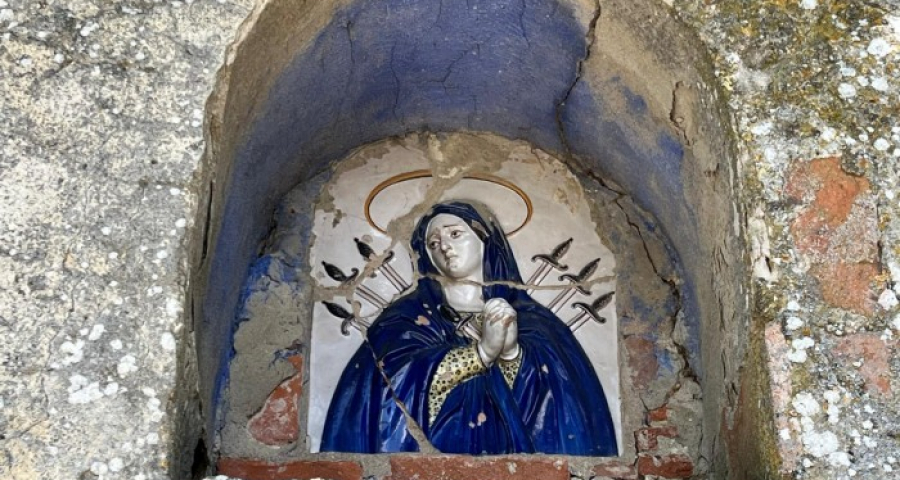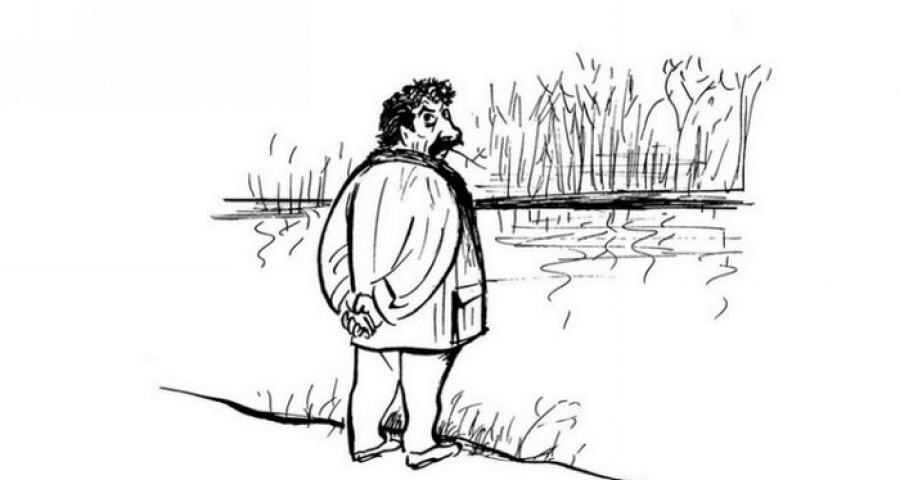Narrative economy/9 - The Logos that has taken our flesh loves to converse. And opens itself up to unpredictable cyrenees
by Luigino Bruni
published in Avvenire on 08/12/2024
I on the other hand, every day
at some edge of a square,
at an outlet of streets.
In the day, always,
looking for bread for the hungry,
to bring light
in the night to the whole city.
Stranger to the same brothers
only company a faith
that is a mystery to myself.
Davide Maria Turoldo, ‘Sola Compagnia’, in Udii una voce, 1952
Don Camillo in his dialogues with the Crucified gives ‘thou’ to God, and reminds us that ‘thou’ is the only right pronoun of faith.
One of the radical novelties brought by Christianity is the good news of the Eternal One who has become one of us. There is nothing more humanistic and humanistic than the God of Jesus Christ, who gave ‘thou’ to women and men, and taught us how to give ‘thou’ to God. Yet Christianity itself soon unlearned this absolute closeness and applied to the deity the same (amplified) privileges of kings, of the powerful, of the great, making God ‘the King of kings’, the Most High above all rulers. We thus imagined him so far away in the high heavens that to reach him we needed the intercession of the saints and Our Lady, because they were close, so they understood us, as if the Christian God was not closer than all the saints and holy women put together. This was also the religious world of Guareschi, who instead invented and gave us a Don Camillo who spoke daily with God as one would speak with a friend. Like Moses, who, the Bible tells us, was the only man to speak to God face to face, ‘as one man speaks to another man’ (Ex 33:11). The only man Moses. ... together with Don Camillo, Guareschi's priest who often calls his God ‘you’ (and even when he uses ‘you’ with Jesus, it is always ‘you’). This tu-a-tu was also known by the poor who, not possessing enough syntax for ‘lei’ and ‘voi’, were and are forced to use the only truly Christian pronoun in prayer: ‘tu’.
For our Catholic grandparents and parents (at least mine), Jesus, among the many deities he was approached with, had a special status. Jesus was considered a divine being, ‘but not God: God is something else’, they said. The focus of the people's pietas was certainly not Trinitarian theology nor Christology, matters too far removed from wheat and water, unclear even to the country parish priests who would have had the task of bridging the gap between true theology and the popular and magical religion of the ‘simple’. But, in that Olympus of divine beings, Jesus and Our Lady were nonetheless different and much loved. They were so for many things, but especially for their ‘great sorrows’. Jesus then almost always stood on the cross, in churches, shrines and homes. And not only because of the bizarre sorrow theology of the Counter-Reformation, but also because the peasants and the people identified much more easily with a Crucified than with a Risen One, in an existence that was much more reminiscent of Good Friday than of Resurrection Sunday. The stones of the tombs were not rolling to put an end to suffering and misery. Children did not return from wars, children died, hunger did not end. And that is why we loved the crucifix so much, why we filled it with words, with caresses and tears, until yesterday. We are not surprised, then, if don Camillo also speaks with his crucified Jesus, not the Risen One. And although the context of the stories is cheerful and often humorous, the dialogues between don Camillo and crucified Jesus are very serious, sometimes even dramatic, almost always beautiful. Like those in the Via Crucis episode.
Don Camillo had made trouble in the village with a certain Marasca, with whom they had come to blows: ‘Such a fuss ensued that the old bishop sent for don Camillo and told him: - Monterana is without a parish priest: leave for Monterana and come down when the old parish priest returns. Don Camillo stammered: - but the parish priest of Monterana is dead. - Exactly - replied the bishop' (G. Guareschi, Don Camillo e il suo gregge, 1953, p. 229). Monterana was a small village lost in the mountains, ‘the most wretched village in the universe’. Don Camillo arrived there first by coach and then on foot, up a stony gully: ‘He entered the parsonage and seemed to lose his breath. He then entered the church, knelt down on the altar step and ‘raised his eyes to the crucifix: - Jesus - he said. Then words failed him: the crucifix on the high altar was a black cross, made of cracked wood, bare and raw. All that remained of the plaster Christ were the hands and feet pierced by the large nails. He was almost afraid of it. And this simple prayer was born to him: ‘Jesus, what becomes of my faith if I feel alone today?’ (p. 230). This is don Camillo's loneliness, which is also that of many country parish priests of past centuries. A life spent in the midst of the people but, in the end, alone, because the sociological company of the mission almost never succeeded in filling the existential loneliness of home and night. But, as Guareschi reveals, those parish priests often had a different and true companionship in their dialogue with Jesus. Don Camillo is an image of those ancient parish priests, who may not always have been prophets or mirrors of virtue, but were friends of Jesus, and almost always of the poor and the people - I knew some of them, among them Don Isaia Picca, the parish priest of my youth.
After these words, don Camillo returned to the rectory, and found ‘on a napkin a piece of bread and a small piece of cheese’. He asked: ‘Where does this stuff come from? The old woman, the dead priest's housekeeper, brought him a jug of water, spread her arms wide, she didn't even know: ‘for years and annorum it had always been like this with the old priest. Now the miracle continued with the new priest’. The Lord makes the bed for the sick, recites the Psalm (41:4). The first experience don Camillo has, confined and alone in a different Barbiana, is abandonment by his God; but, immediately afterwards, he experiences his providence. The world is full of women and men who, while experiencing all forms of abandonment, loneliness and spiritual depression, are reached by a mysterious but real providence, which becomes that crumb of bread and glass of water that makes you feel loved and able to continue your journey. On earth there is much more providence than we can recognise and call by this sweet name.
But it is here that a thought creeps into Don Camillo. He spends a few days in bed with a fever, one morning he gets up and despite the bishop's ban (‘don't move for any reason’), he comes down from the mountain, gets on the bus and goes back to his village (Ponteratto, or Brescello in the films), precisely to the courtyard of Peppone's house. He asks him for his truck for an urgent service, and in the middle of the night they leave. First they stop at the village church. Peppone stays at the wheel, and Don Camillo does his job. They drive about thirty kilometres, and when they reach the crossroads for Monterana, don Camillo gets out, takes his load, ‘and when Peppone sees him appear under the light of the headlights, he blinked his eyes. The crucified Christ'. Don Camillo had come down from the mountain to take back his Jesus. ‘Can I give you a hand, Reverend?’ exclaimed Peppone. ‘Don't touch! Go away’. Bon voyage, Peppone replied. And, ‘in the night began don Camillo's Via Crucis’ (p. 234).
The crucifix was enormous: ‘Christ carved out of hard, solid wood. The mule track was steep and the large stones wet and slippery'. He fell on a sharp stone, ‘felt the blood dripping from his knee, and did not stop. A branch took away his hat, and wounded his forehead, and he did not stop... And his face brushed against the face of the crucified Christ.’ After four hours, ‘by then he had no more strength and it was only his despair that kept him up. That desperation that comes from hope' (p. 235). Here Guareschi perhaps put into this via crucis the years he had spent in the prison camps during the war, where, like all prisoners of all wars, in order not to die he had had to discover a mysterious desperate hope - even this paradoxical hope is providence for the poor (‘come father of the poor’), the daily manna in the deserts. It was ‘a giant's struggle but, in the end, Christ Crucified was up there’ (p. 235).
Don Camillo wanted his Jesus. Any Jesus was not enough for him, he wanted his own. To tell us, perhaps, and in spite of Guareschi's intentions, something important - let us not forget that Don Camillo is also Guareschi but he is not just Guareschi, and we must not lay the faults or limitations of their fathers on the children (the characters). Faith is not generic, it is not an abstract belief in God or theological truths and dogmas. No: faith is an encounter, it is a relationship, hence it is dialogue. It is not invoking the Most High, but giving ‘thou’ to a personal presence, close and friendly, very mysterious and yet at home. That is why when faith is lost, or we feel that it can be lost, we return to the places where we have met and dialogued with our Jesus, with our God.
Every faith is like that, but the Christian one is in a very special way, because that logos became flesh, within that flesh became dia-logos. Jesus was a dialoguing prophet-master, a dialogue so important that the gospels show him in dialogue with men even on the cross. And if faith is encounter and dialogue, then it is a personal, personalised, interpersonal affair: every believer has his Jesus, and he pronounces this name with a unique and unmistakable timbre and tone - who knows whether, in the end, we will be called by name because we recognise what we call Him?
There were only two people in the church, and one was Peppone, who had not left (‘go away’), and ‘although he did not have the cross on his shoulders, he had participated in that immense effort as if the weight had also been on his shoulders’ (p. 235). Peppone had become another Cyrenian. For that pietas, still alive in that generation of Italians and Christians, who beyond or before the political and ideological struggles knew how to recognise in the face of every man, even in those of the soldiers of the enemy armies, the face of a brother, of a Christian. And so, when the adversary ran into misfortune, one would lay down one's arms and set the table at home for him, offer him a meal, accompany him, perhaps in silence, in his way of the cross. As long as people in a community are capable of accompanying the painful ways of adversaries, that community still has a soul - the one we are losing: forever?













